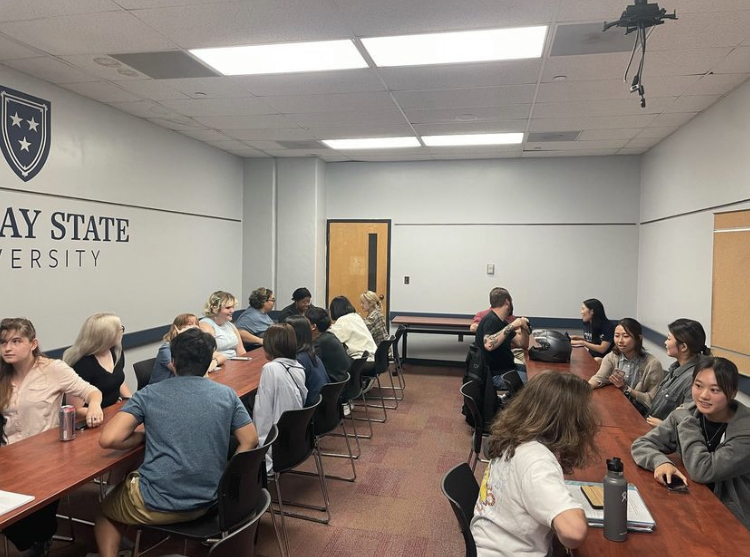Japanese major set to discontinue after the 2022-23 academic year
The Japanese Club hosted Japanese Table at the Curris Center which allowed for those in the major and those interested in the language to practice their speaking skills. (Photo courtesy of msu.japaneseclub on Instagram)
October 13, 2022
Students majoring in Japanese received an email informing them they can finish their degrees. However students who had yet to declare their major or incoming freshmen will no longer be able to declare Japanese as a major thanks to an announcement from the Department of Global Languages and Theatre Arts.
Students who began their majors before the 2022-2023 academic year will still be able to complete their degrees within the next 2-3 years.Japanese classes will still be offered at Murray State.
Junior Sam Kincer is a Japanese major. Kincer said Japanese is an important language to learn and is desirable for government jobs.
Japanese is in high demand for companies along with other major Asian languages, including Mandarin and Korean, according to the Bureau of Labor Statistics.
“[Murray] was one of the only places in Kentucky where you could get a degree in Japanese,” Kincer said. “With the education and certification tracks also no longer available, it will hurt high schools which desperately need foreign language teachers in general.”
Kincer said Professor fought hard to keep the Japanese major at Murray State.
Hatakeyama is an instructor of Japanese for Murray State and the director for KIIS Japan Program. Hatakeyama said she is disappointed the major will no longer be available.
She said there is a large interest in the Japanese language and culture at the University. The Japanese Club, which discusses Japanese culture, and the Japanese Table, which invites students and faculty to converse in Japanese, each has at least 50 members at their meetings.
Murray State Japanese students also have participated in the Bluegrass Area Japanese Speech Contest. This year, three Murray State students ranked first, second and third in the level five category—the highest level—and one student ranked first in level four.
“The students this year and in past years have been so enthusiastic and participate so well,” Hatakeyama said. “We will continue to make Japanese accessible by offering individual classes.”
Hatakeyama said the Japanese Exchange and Teaching (JET) Program is a good opportunity for Japanese language students to gain real-world experience. The JET Program allows graduated students to work in Japan as assistant language teachers (ALTs) and coordinators for international relations (CIRs).
ALTs help teach English to students in Japan. They are assigned a city or township that could be located anywhere in Japan. ALTs also serve as cultural ambassadors by teaching students about American culture. ALTs are recommended to have some fluency in Japanese for the position.
CIRs serve in local governments with internalization efforts. They are expected to translate official documents, interpret for official guests and plan and implement international exchange programs. Fluency in Japanese is required for the position.
Tye Ebel, JET program coordinator for the consulate-general of Japan in Nashville, Tennessee, said the program looks for applicants who have a deep interest in Japanese culture. He said the program allows its workers to connect with Japanese people and immerse themselves in the culture.
“It is a selective program,” Ebel said. “Only 25% of applicants are accepted. Murray’s strong track record with its students being accepted is a testament to the sway and good work Hatakeyama does promoting on and off campus.”
Since 2019, 13 Murray State graduates have been accepted into the JET Program. Professor Hatakeyama said 12 Murray State graduates are currently working in Japan.
Although the Japanese major is set to be discontinued, Murray State will still offer a Japanese minor.




























































































